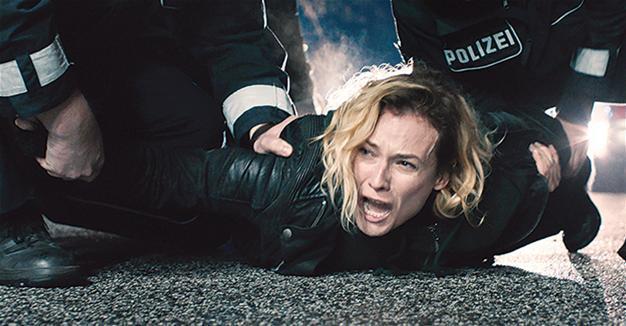Fatih Akın's emotional film on global terrorism
Vecdi Sayar – CANNES

Fatih Akın’s “In the Fade,” an emotional and powerful film about global terrorism, stands a strong chance at receiving a prize at the awards ceremony of the 70th Cannes Film Festival. The film was viewed by the international press on the morning of May 26, with Akın answering questions from journalists after the screening.
The main concern for Akın, a German director born to a Turkish family, is to focus on the lives of people, especially mothers, who are left behind, instead of analyzing the political motives of the murderers, in this case, members of the NSU movement, a neo-fascist movement in Germany, responsible for killing many immigrants. Akın said it does not matter who the terrorist is; they could have been from another organization with other political motivations.
“In the Fade” is a family film as well as a thriller. Akın portrays a German woman whose Turkish husband and six-year-old child are killed in a terrorist attack in Hamburg. The woman decides to punish the killers, after they were set free by judges, who said the evidences were not justified. We witness her hesitation in making a decision. Which direction will she go? The director describes the emotional changes the character (wonderfully acted by Diane Kruger) undergoes in this process.
“In the Fade” enables its audience to identify with the main character; which is not the case in some of the best films in this year’s competition, such as “Happy End,” “Loveless” or “The Square,” which tell their stories from a distance.
Akın’s film is composed of three parts, titled “Family,” “Justice” and “Sea” (“Sea” is representing death). The globalization of terror is an issue for the film. Akın underlines the existence of a global network of neo-Nazis, but does not go toward this direction. Instead, he chooses to analyze our reaction to the “evil.” Is hatred a solution against hatred? We all have dark sides (shadows, as the director names it). How can we cope with these shadows and keep them dormant? This is the main question put forward by this open-ended film.
Kruger and others
As the award ceremony is approaching, speculations over the possible winners are also spreading. It seems to me that the jury will give a big prize to “In the Fade.” Can it be a Golden Palm? I don’t think so. But it may win either a Jury Prize or the Best Actress. As I have said before, Kruger deserves such an award. Among other strong contenders for this prize are: Isabelle Huppert, for her performance in “Happy End,” Nicole Kidman for either of her roles in “The Killing of the Sacred Deer” or “The Beguiled.” This prize might as well go to a young actress. There are several candidates; Marine Vacht from the film “L’amant Double” by French helmer François Ozon, the two wonderful Russian actresses Maryana Spivak from “Loveless” and Vasilina Makovtseva from “Krotkaya,” Stacy Martin who played Anne Wiazemsky, the actress-lover of Godard in “Le Redoutable.”
For the Best Actor prize, I would name Colin Farrell with two films (“Killing of a Sacred Deer” of Lathimos and “The Beguiled” of Sofia Coppola), Vincent London of Doillon’s “Rodin,” Kwon Haehyo from the South Korean title “The Day After,” Robert Pattison from American “Good Time” or Claes Bang from “The Square.” Of course the protagonist of the last film in competition, “You Were Never Really Here” - which we haven’t seen yet - Joaquiın Phoenix might be a strong candidate.
And the Golden Palm goes to...
In my opinion, the line-up of this year’s festival was not strong, but some six films came forward among the 19 contenders. “Happy End” by Michael Haneke, “Loveless” by Andrey Zvyagintsev, “The Day After” by Hong Sangsoo, “In the Fade” by Fatih Akın, “Radiance” by Naomi Kawase and “The Square” by Ruben Oslund are my favorites for the big prizes: the Golden Palm, Grand Prix, Best Director, Best Script and Jury Prize. “120 Beats per Minute” by Robin Campillo is among the titles that could reserve its place in the awards list, due to its content, rather than cinematographic qualities.
“Le Redoutable” by Hazanivicus and “The Killing of a Sacred Deer” by Lathimos can also be considered for some prizes, though not a Palm, despite the fact that they were mostly hated by the critics. I must underline the fact that the film by Scottish woman director Lynne Ramsay “You Were Never Really There” is not seen yet.
The main prizes will probably be given to these titles: one will get the Palm, and others will share the other prizes, but it is difficult to imagine how the choices of the jury will be. But, there may be surprises because you can never predict the jury’s taste, especially when there is a president like Pedro Almodovar. If you ask my opinion, I would give the Palm to Haneke and Grand Prix to “Loveless.” Let’s see what the jury decides on the closing night.
 Fatih Akın’s “In the Fade,” an emotional and powerful film about global terrorism, stands a strong chance at receiving a prize at the awards ceremony of the 70th Cannes Film Festival. The film was viewed by the international press on the morning of May 26, with Akın answering questions from journalists after the screening.
Fatih Akın’s “In the Fade,” an emotional and powerful film about global terrorism, stands a strong chance at receiving a prize at the awards ceremony of the 70th Cannes Film Festival. The film was viewed by the international press on the morning of May 26, with Akın answering questions from journalists after the screening.